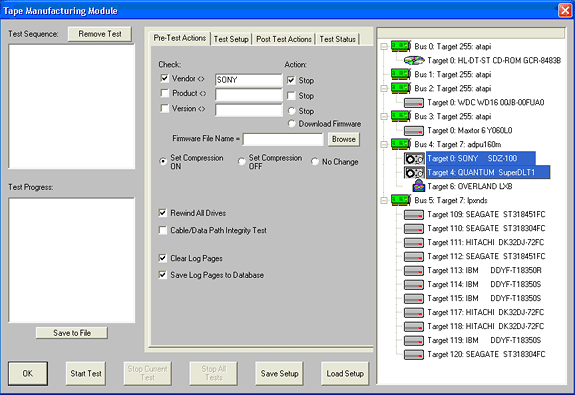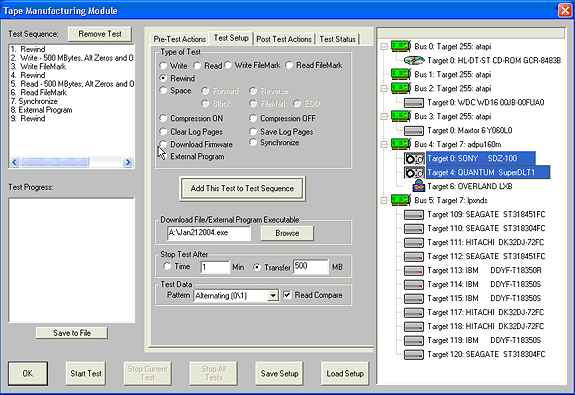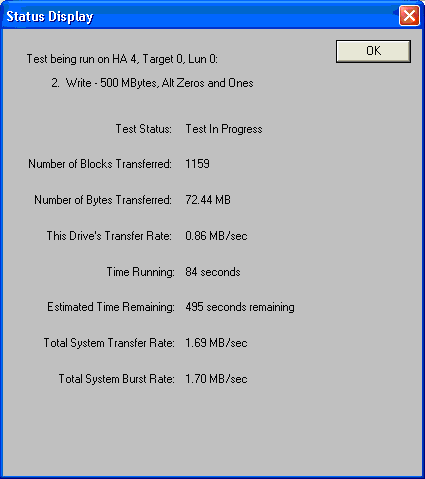Products >
Tape Manufacturing Module
Product Manual
MS Word |
PDF
|
|

SCSI Toolbox Tape Manufacturing Module
SCSI Toolbox LLC is proud to announce the Tape Manufacturing Module
addition to the SCSItoolbox,
joining a decade of real-world tape drive testing experience with
input from hundreds of customers to bring the best new testing tool
to the tape manufacturing and integration marketplace.
The Tape Manufacturing Module is the easiest to use, most versatile,
and fastest tape testing product on the market. A true multi-threaded,
multiple host bus adapter, multi-drive screening and testing tool,
the Tape Manufacturing Module allows you to:
- confirm that the proper drives are in the subsystem
- download new drive firmware if needed
- set compression on or off
- log and track all error information
- run any type of test, or sequence of tests at full bus
and device speeds
- run ANY external program as a part of
the test sequence
- log all process activities, drive information, and any errors
to an Access database
- create an individual text log file for each device tested
All processes and test sequences are created from a graphical user
interface – no programming or scripting is required! Time
from installation to a complete test process can be as little as
5 minutes!
Defining the Test Process
Test processes are divided into three sections, pre-test, test,
and post-test.
Pre-Test
The pre-test process allows your test to screen the attached drives
by the following qualifiers:
Drive Vendor – you can specify
that a drive must match a certain vendor code, or the drive will
be rejected from the test. Example = “QUANTUM”
Drive Product – you can specify
that a drive must match a certain product code, or the drive will
be rejected from the test. Example = “SDLT600”
Drive Firmware Version – you can
specify that the firmware version of each drive must match a specified
version. If the version does not match the drive under test the
drive can either be rejected, or the proper firmware file can be
downloaded into the drive.
Rewind All Drives – all drives
can be rewound before the test sequence is started.
Set Compression On or Off – test
with or without data compression enabled.
Clear Log Pages – all Log Page
(error and performance) data can be cleared at the beginning of
the test process.
Record Mode or Log Page data –
all Mode and/or Log page data can be logged at the beginning of
the test process.
During the test process, each drive will be individually checked
against any or all of the above parameters.
The entire pre-test process definition is accomplished by using
the simple GUI choices as show below:

Test Configuration
The test process will be made up of one or more test sequences.
Each test sequence is defined by selecting test definition parameters
from the Test Configuration Menu. Once a test is defined the test
is added to the test sequence list.
The following tests can be used in a test sequence:
Type of Test
- Write
- Read
- Write FileMark
- Read FileMark
- Rewind
- Space Forward by Block
- Space Forward by FileMark
- Space Reverse by Block
- Space Reverse by FileMark
- Space to End Of Data
- Turn Compression On
- Turn Compression Off
- Clear Log Pages
- Save Log Pages
- Synchronize
- Run External Program
Data Patterns
- 13 data patterns are available
- Data compare on read can be turned on or off
Test Duration
- Read and Write tests can be selected to run for a specified time,
or run until a specified amount of data has been transferred.
In the same manner as the pre-test conditions, tests are easily
and quickly defined with the GUI as shown below – no editing,
no syntax or language to learn, no way to make a mistake!

Device Selection
Drives to be tested are selected from a simple tree control. Any
drive on any Host Bus Adapter (SCSI, Fibre Channel, ATAPI) can be
selected for test.
Once drives are selected and the test process has begun, color-coded
indicators show each drives status, and each drive may individually
be:
-Paused – pause the current test
-Resume – resume the current test from where it was paused
-Stop Current Test – stop the current test and proceed to
the next test in the test sequence, if any
-Stop All Tests – stop any further testing on the drive
-Show Status – display the current test being run, the status
of the test, performance and error statistics
Again, each drive can be individually controlled and
monitored during the test process!
Here is an example of the current status of a drive under test:

The Fastest tape test/screening system available!
The Tape Manufacturing Module tests and configures each drive as
if it were the only drive being tested. This means that as fast
as a given drive/HBA combination will run, that is how quickly your
test process will finish.
For instance, if you have two Ultra 320 HBA’s in your system,
and one Ultra 160 HBA, the drives connected to the faster subsystem
will not have to wait for the slower drives!
If you have a 5 step test sequence, the faster drives will finish
each step and move on to the next as fast as they can, without waiting
for the slower drives to finish!
If your business relies on processing as many drives as possible
(as thoroughly as possible of course!) – the Tape Manufacturing
Module will maximize your test process and your profits!
The Ultimate in reporting / data collecting
The Tape Manufacturing Module records every event that happens
during the test process to an Access database. If you need to look
at any part of your test process later down the road, the Tape Manufacturing
Module has already collected all data for you. Detailed information
on each drive tested (vendor, product, firmware version, mode page
settings, what tests were run, test results, performance numbers,
detailed error information) is all logged to a data base that can
be accessed any way you would like.
In addition, and individual text file is created for each device
tested. All test information and results are logged.
Need to include custom test methods?
The Tape Manufacturing Module allows you to synchronize all device
tests, and to run any external program
as a part of a test sequence. For example, you could:
- Control any brand of environmental/temperature chamber right from
your test sequence
- Run an external program to access vendor unique factory log information
during a test sequence
- Control a programmable power supply
- Send an email to notify a test event
But wait . . . there’s more!
All of the tests included in the Tape Manufacturing Module are
accessible from our Developers Toolbox – so you can write
your own tests using Visual Basic or Visual C++ and have instant
access to our multi-threaded tape test library! So if you need to
include high level tape tests into your existing or new test processes,
our tests are just a few moments of programming away!
The most economical test solution
The Tape Manufacturing Module will be included with the SCSItoolbox
as of March 2004 (STB version 5.0)
That equals a cost of zero! No extra charge at
all when you buy the industry standard interactive test system,
the SCSItoolbox.
Being the industry leaders in SCSI and Fibre testing for the past
decade, we are proud to bring our years of experience to a new focal
point with the Tape Manufacturing Module.
We are familiar with the other products and solutions in the market,
and we are confident that the Tape Manufacturing Module is by far
the most superior product.
We guarantee that the Tape Manufacturing Module solution is the
most
-versatile,
-easiest to use,
-fastest, and
-the best value
Try it for 10 days and see if we’re
not right!
Protocol Support
- SCSI (All interfaces - single-ended, differential, SCSI 1, 2,
3, wide or narrow devices, Ultra II, Ultra3)
- Fibre Channel (FCAL)
- Magneto Optical (MO)
- Serial Attached SCSI (SAS)
- iSCSI
- Serial ATA (SATA)
- ATAPI
- PCIe
- NVMe
Operating System Requirements
The SCSItoolbox Suite is available for the following platforms:
- Windows XP SP2 or later (32 and 64bit)
- Windows Server 2003 SP2 higher (32 and 64bit)
- Windows Server 2008 (32 and 64bit)
- Windows Server 2012 (32 and 64bit)
- Windows Vista (32 and 64bit)
- Windows 7 (32 and 64bit)
- Windows 8 (32 and 64bit)
- Redhat Linux Kernel 2.6 or newer (API's only)
|








